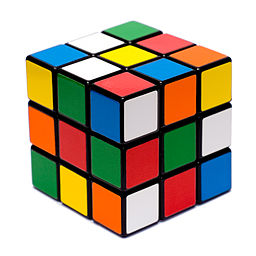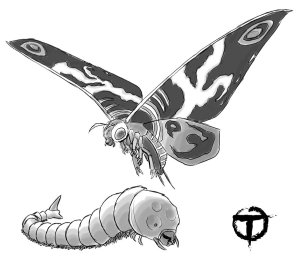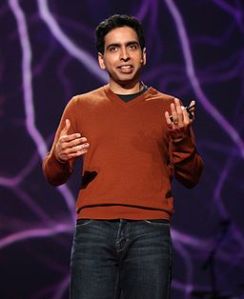 Fernando’s Amazing Rubik’s Cube Internet Adventure
Fernando’s Amazing Rubik’s Cube Internet Adventure
While a forbidding blizzard swirled outside, my 12-year-old son Fernando sat at our kitchen table mesmerized by a Rubik’s Cube. After about 15 minutes spent twisting and turning the colored squares to no avail, he decided it was time to fire up “the Google,” as it is affectionately known in our family. Several YouTube links later, he had not only learned to solve the Cube, but was on a Skype videoconference showing his buddies, all in the space of about an hour. Later he attempted to teach me what he called “the solution matrix,” a process that involved executing a series of lengthy “nested algorithms.” Even when armed with a video demonstration, solving a Rubik’s Cube is not an activity for the faint of mind. It is nothing like the YouTube feature I watched a while back showing how to use a jump box on a dead car battery: jump-starts for idiots.
MOOCs, Mothra and the Threat to Traditional Higher Education
Several weeks after that snowstorm, while attending Ashoka U’s annual exchange, I found myself thinking deeply about Fernando’s adventure with his Cube. Ashoka U is an energetic and highly successful effort to stimulate social-entrepreneurship education within a rapidly expanding network of model colleges and universities across America. One of the conference themes featured quite a lot of dialogue and excitement (along with some handwringing) about the possible disruptive innovation that Massive Open Online Courses, also known as MOOCs, pose to traditional higher education. You have to love this acronym, MOOC. I don’t know why exactly, but it makes me think of Mothra, the giant moth that was always doing battle with Godzilla. In this case, Godzilla represents the old-style higher-education system, while Mothra is the butterfly-like counter-monster who will save the human race, but sometimes weirdly befriends Godzilla when necessary to fight monsters from outer space (like diploma mills). What is so interesting about MOOCs, you may be wondering? Those familiar with MOOCs may skip the next paragraph.
Sit down, you’re in for a shock. The GREATEST UNIVERSITIES are intent on GIVING AWAY their knowledge for THE BENEFIT OF MANKIND. This will threaten the lesser higher-education institutions with obsolescence. Wikipedia has this wonderful definition of obsolescence: “The state of being which occurs when an object, service or practice is no longer wanted even though it may still be in good working order.” (How I feel sometimes about myself when I stare too long in the mirror.) At any rate, these august institutions will soon be unnecessary because the people of the world will be FREE AT LAST to go forth and LEARN EVERYTHING using the MOOCs. In the words of Clay Christensen: “What the theory of disruptive innovation suggests is that the business model of many traditional colleges and universities is broken. Their collapse is so fundamental that it cannot be stanched by improving the financial performance of endowment investments, tapping wealthy alumni donors more effectively, or collecting more tax dollars from the public. There needs to be a new model.” See Disrupting College (2011).
Questions, questions… What will happen when the virtual doors of the MOOCs are all flung open and the people of the world can learn on their own without ye olde universities and colleges blocking their way? How will average professors earn a living when everything they do is mass produced at a very high quality with fabulously entertaining professors through the MOOCs, and given away as if it were fresh air in a national park? It is really true that eventually Salman Khan will be able to teach everyone everything, and all he needs is a video camera, a blackboard and his hand? Is anything worth teaching if it cannot be disseminated to millions of people simultaneously? And what of the textbook companies of the ancien régime? Did you know that soon textbooks won’t exist anymore? Soon they will be replaced by ad-supported online interactive courseware driven completely by artificial intelligence, otherwise known as AI, and important to disambiguate from Allen Iverson (yes, disambiguate!—see Wikipedia). Beware, the MOOCs’ RANDOM ACTS OF DISRUPTIVE INNOVATION are gathering like a mile-wide meteor about to strike the earth. This time, it is bricks-and-mortar higher-education institutions with their minor-league professors that are going to become extinct, following their long-lost ancestors, Tyrannosaurus rex, Triceratops and typewriters. Inside the after-crater, we will find nothing but millions of people sitting alone under trees (but also working interactively with each other in spontaneous, far-flung Google hangouts), happily and efficiently downloading free calculus lectures from the Wi-Fi cloud onto their tablets. And all this may all be paid for with a large grant from the Gates Foundation.
OK, I have exaggerated… a bit. While statements in the spirit of the above were made frequently at the conference, they were also then hastily qualified. (“MOOCs will definitely make universities obsolete within five years, unless, after all, they don’t.”) When the highly educated people who actually work in higher education are gathered together within a metaphorical hall of mirrors to think about the future (or lack thereof) of what they do, you can be sure about this: All of their statements will be qualified, for the most part.
To be fair, when you consider cases like Fernando’s Amazing Rubik’s Cube Internet Adventure, it is hard not to be deeply impressed about the potential power of online learning. On the streets of Brooklyn where I grew up in the 1970s, in the days when a push-button payphone seemed kind of cool, I can’t ever remember small groups of children demonstrating or even discussing things like Rubik’s Cubes, let alone mastering them without help from an adult wearing thick glasses. We had things like Frisbees, handballs and Duncan yo-yos that didn’t require a lot of thought. I recognize that the Rubik’s Cube was invented in the 70s (although it did not become a phenomenon until the 80s). And yes, we played chess with the help of library books. I know that in those days Steve Wozniak was somewhere on the other coast inventing the personal computer (and let us remember, Woz went back to graduate from Berkeley after founding Apple with Steve Jobs), but what I mostly recall from those days involved lounging about listening to Peter Frampton and Bruce Springsteen, as well as learning how to wrap firecrackers in old newspapers and then setting the whole contraption on fire while it was hanging from a tree. Spectacular!
There is no doubt that something extraordinary is happening in the dissemination of knowledge and information, something much more profound than sharing LPs and amateur arson techniques. What exactly is it? Two extraordinary innovations are underway.
First, an already enormous and steadily increasing amount of actual knowledge is being made available over the Internet. This part is important: It contains more than cat videos. Second, the Internet’s effective use as a tool for broadcasting text, images, video and sound has scaled rapidly and continues to do so at an astounding rate. As little as five years ago, real videoconferencing was a luxury that only large organizations could afford. Today a high bandwidth connection can be had for less than $50 per month and videoconferencing is essentially free for anyone with a Gmail account and cheap webcam. Anything deemed important, beautiful, interesting or simply entertaining can be spread around the world within minutes, and the publisher need not have significant resources to accomplish this.
A critical insight is that MOOCs are an extension of these fundamental breakthroughs. There is nothing that happens in a MOOC that hasn’t already been happening on YouTube, Facebook, Twitter, Google and the Web itself. What is a MOOC in substance? It’s smart people thoughtfully sharing video, text and images, and providing feedback to one another. In other words, it’s the Internet organized into courses. Now we are ready to address our central question.
Is It True? Do MOOCs Signal the Imminent Death of Typical Colleges and Universities?
Probably not, and here’s why. To understand why MOOCs are very unlikely to disrupt colleges and universities, you have to reflect carefully on what these institutions actually aspire to do. You might be tempted to believe that their role is simply to increase the knowledge and skills of their students. But this description fails to capture the most profound elements of collegiate learning.
Colleges and universities aspire to provide individualized, interactive learning within a social network. In their most potent manifestations, colleges and universities create learning communities. Students going to college aspire not simply to gain knowledge and skills, but to become part of these communities. The most profound learning that takes place on college campuses happens through structured dialogue within learning networks in which professors engage with students in small groups (and often one to one). Deep learning is embedded within these exchanges; students apply and experiment with the concepts that they are learning and receive feedback through which they gradually master course content. The prototypical examples of such interactions involve students writing papers, working on complex contemporary problems, engaging in project-based learning and practicing a variety of clinical skills in which part of the assessment is deeply contextual and involves observing close human interactions.
Why does this matter to the future of higher-education institutions? Because unlike the process of broadcasting content, from a resource perspective, individualized interactive learning does not widely scale through the miraculous powers of the Internet. Think about this for a moment. You can easily deliver a lecture on how to write a great essay to a million students using YouTube. But can you use YouTube, or any other technology, to provide individualized written feedback on effective writing for the multitude of essays that the students produce? Not yet. Naturally, professors can assess students through the Internet at normal ratios of say, 1 to 20 or 30. What we are questioning is the MASSIVE OPEN part of the ONLINE COURSE equation, suggesting that one or two brilliant professors can do the job for millions, radically restructuring the cost of higher education.
Of course, there is talk of robots and artificial intelligence that will be used to grade essays and score math tests, but such resources are wildly overhyped. The average math textbook has numerous problems with solutions and explanations so you can grade yourself while learning from your mistakes, but that hasn’t led students en masse to master mathematics independently. Most humans need one-to-one human coaching in learning tasks of major importance. Otherwise we could potty train our children with YouTube videos. Watch this, darling. Would that it were so! Personalized learning interaction involves pointing out shortcomings while giving individualized advice about how to improve. This still requires human beings working within live, small-group interactions. It does not scale without large resource commitments.
Another way to make the point is to ask why public libraries have not rendered higher education superfluous. The answer is the same: Libraries have no ability to scale individualized feedback and interactive learning. You can check the books out, but no one can tell whether you read or understood them. You can’t discuss the books in the library in a way that promises mastery of their content. The difficult and expensive truth is that individualized interactive dialogue within a community is one of the most powerful tools for actual learning. It is what separates those who have deep rather than glib understanding. One who uses a concept in the context of individually guided practice understands it at an extremely different level from one who merely observes and recapitulates it. Without practice, learning is often an illusion.
So what about the Rubik’s Cube? Doesn’t that story prove the power of online learning? Here’s something to think about. Real life is not like a Rubik’s Cube, which comes with an idealized state built into it. It can be manipulated by anyone to achieve that state. It is a self-contained puzzle with a neatly defined, singular solution. Unfortunately, the real world is not like this at all. Indeed, it is the exact opposite: an undefined, chaotic, wide-open morass with no solution and an infinite set of indeterminate explanations. The world is also rapidly changing and evolving. It is subject to a diversity of correct and incorrect answers. There is no one right way to write an essay about a play or a poem. There are infinite possibilities to be wrong and to be right. Effective written and oral communication is highly personal and contextual. Watching my children learn higher math, I have come to understand that even highly technical matters like solving math problems also involve art as much as science (I bow to you, mathematicians). In short, if the Rubik’s Cube were a living, evolving system like the world, the Internet would not be able to provide a one-hour mastery course. It would be an important tool, among many others—a way of connecting with others but not a singular, transformative solution.
Social and Emotional Learning, and Social Hierarchies
Two other points need to be made about the underlying purposes of higher education. First is that some of the most important skills gained through higher education have nothing to do with academic content. Instead, these skills involve the social and emotional learning that takes place within the community, the ability to work in teams and groups, and to form personal relationships and social networks. Because humans have evolved over millennia through face-to-face interactions (as against less than 20 years of interactions through video screens), online courses at present do not scale this type of social and emotional learning very well. A timely example of the ongoing importance of personal, face-to-face interactions can be found in Marissa Mayer’s decision to pull Yahoo employees back into the office. Marissa hailed from none other than Google, creator of the video hangout. So even in the highest of high-tech companies, face-to-face encounters are understood to be critical to teamwork. The world is full of smart, highly knowledgeable individuals who are unable to work well with others. Employers understand that geniuses who lack social and emotional intelligence are not effective. The labor market rightly views success within traditional higher education, in which a student must interact with numerous diverse social systems, along with idiosyncratic individuals and bureaucracies, as an important training ground and an effective proxy for real teamwork experiences.
Second, we must acknowledge that higher education has traditionally played a role in creating social hierarchies. You can bet that if by some miracle the work of higher education were to become widely democratized through MOOCs, then existing institutions would simply move the goal posts. This is exactly what has happened with secondary education. Graduating from high school used to mean something important in the workplace. Today, since the majority of workers graduate from high school, it means much less. The same will be true if college degrees become ubiquitous. We already see this reality in many professions. A lot of basic medical and legal services could be effectively practiced with less formal education than we provide to doctors and lawyers. Workers in these professions (and others) gather together and raise the education standards, thus restricting the labor supply and thereby protecting wage premiums. Barriers to entry are a feature of the labor force that will be rebuilt if the existing barriers fall.
So if MOOCs don’t kill higher education, is that a problem? Of course not. MOOCs are amazing and wonderful. Khan Academy is fantastic. Let us remember all of the powerful entrepreneurs and social entrepreneurs who self-educated, confidently skipping the process of being assessed and credentialed: Bill Gates, Steve Jobs, Mark Zuckerberg, Ted Turner… the list goes on and on. There are undoubtedly people who will make use of MOOCs today and then charge ahead to change the world, let the degrees be damned. More power to them.
In the end, Mothra puts up one hell of a fight, but Godzilla survives… just like college. See for yourself:
[Feel free to contact me for permission to reprint this article.]




